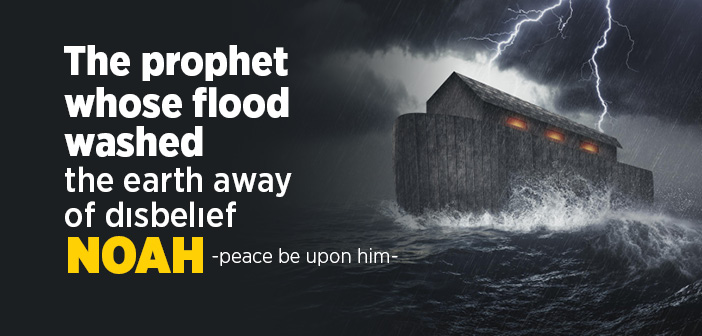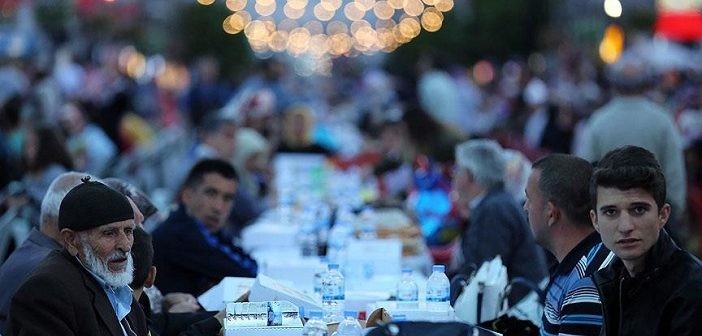
The Story of Prophet Noah
Who is prophet noah? What did prophet noah invent? What are the characteristics of the prophet noah?
Noah (as) features prominently both in the Qur’an and the Prophet’s (saw) hadith. He is among the ulu’l-azm prophets.[1] The Qur’an mentions him exactly 43 times, while the 71st chapter is named after him. Due to the Great Flood, he is considered the ‘Second Father’ of humankind.
After Idris (as) was raised to the heavens, people lost their way and began worshipping idols and statues. Noah (as) was then sent as a prophet.
Reports suggest his name at birth may have been Yashkur, Sakin or Abdulghaffar. He is known as Najiyyulah, the one Allah has saved, and Sheikhu’l-Anbiya, the prophet with the longest lifespan.
Idris (as) had a number of followers. Among them, Wadd, Suwa, Yagus, Yauq and Nasr continued to spread his message and were highly respected because of it. However, after they passed away, people yielded to the devil’s whispers and made statues in their images to remember them. A short time later, they found themselves worshipping the statues. They believed the statues held some divine power.
Ibn Abbas (ra) explains:
“The idols that the people of Noah (as) worshipped were later picked up by the Arabs. The idol known as Wadd was at Dumatu’l-Jandal and belonged to the Kalb tribe. Suwa belonged to Huzayl. The Murad tribe had Yaghus until Banu Ghutayf seized it and installed it at a place called Jurf close to Saba. Yauq was in the possession of Hamadan, while Nasr was with Himyar. These idols were in fact named after righteous people. When they passed away, Satan enticed people to, ‘…make statutes in their loving memory’. People yielded. They did not worship the statues at first. However, in time, all was forgotten and ignorant masses began worshipping them”. (Al-Bukhari, Tafsir, 71/1)
Noah (as) was born to a clan near Kufa, which remained firm on the true path and kept its distance from paganism. He was both a shepherd and a trader. The chief of the people was a tyrant called Darmasil, who was a descendent of Cain. Each tribe had its own idol and each idol had a servant. Noah (as) found this practice laughable. Along with paganism, immorality had also become a problem.
The Characteristics of Noah’s (as) People
- They were pagans. The Qur’an says:
“And they said, ‘Never leave your gods and never leave Wadd or Suwa’ or Yaghuth and Ya’uq and Nasr!’” (Nuh, 71: 23)
Throughout history, idols and idolaters have always lead people astray. Statues once made to remember people have in time turned to objects of worship.
Making idols to represent the so-called deities men believe in and worship has its roots in anthropomorphism, which is to ascribe human traits to Allah. This belief leads people to worship their own products and eventually to paganism. Yet, religions based on tawhid stress that God transcends all images and representation. This belief takes a person away from physical matter into abstract meanings and encourages him to try and grasp the spiritual truth behind the appearance of things. However, lazy minds recoil from attempting to reach this higher plane and take the easy way out. They mistakenly try to imagine and represent God in the narrow confines of their physical thoughts. Invariably, this has turned people into pagans.
Islam eliminates this tendency in man by banning all attempts to liken God to anything physical. To prevent man from transforming the abstract into a tangible object and worshipping it, it does not condone images and statues. These come with another harm in that they limit imagination and blunt the ability to think about and grasp higher, abstract truths.
The Prophet (saw) had even banned people from visiting graves, as many of the practices of the time would veer people into the domain of grave worshipping. The ban was lifted only when the belief in the Oneness of Allah became well entrenched in people’s hearts:
“I had forbidden you from visiting graves…but that is now no more”. (Muslim, Janaiz, 106)
“Visit graves if you wish…for it will remind you of the afterlife”. (Al-Tirmidhi, Janaiz, 60)
Thus, visiting graves has been recommended to the extent that it helps remind us of death and gives us opportunity to send presents to the deceased by reciting the Qur’an and donating its rewards to them.
But it must be borne in mind that when praying by the graves of spiritual elders, one must only ask Allah (jj). Asking from the people in the grave would otherwise take a person to idolatry. That was how it all began with the people of Noah (as).
As the Almighty does not resemble any created being, He transcends all shape and dimension. Islam refers to this attribute as mukhalafatun’lil-hawadith, the opposite of all things created. Sheikh Shibli says:
“The moment you think you have grasped the Lord and properly understood him, those thoughts are returned to you. That is because those thoughts are nothing but the whims you have fabricated. Like you, they are created.”
Here, Sheikh Shibli draws attention to the need to distinguish what is created from what is not; and that there is no other way to recognize Allah than through the qualities Allah has told human beings about. Putting aside revelation and trying to think of Allah as something tangible would only lead man to dismay.
Scholars have said:
“Allah is beyond whatever thought of Him that crosses your mind”.
The human mind is created. It is impossible to picture the Creator through it. When Moses (as) spoke to Allah, he felt ecstatic and insisted to take it a step further by seeing Him. The Qur’an recounts:
“He said, ‘My Lord, show me Yourself so I may look at You.’ Allah said, ‘You cannot see Me but look at the mountain: if it should remain in place, then you will see Me.’” (Al-Araf, 7: 143)
Only a portion of people who will enter paradise will be able to see Allah.
- The Qur’an describes the people of Noah (as) as tyrants and transgressors:
“They were unjust and oppressing.” (Al-Najm, 53: 52)
- They were sinners.
“They were people who were defiantly disobedient.” (Al-Dhariyat, 51: 46)
- They were depraved and wicked.
“They were people of evil.” (Al-Anbiya, 21: 77)
- They had lost their moral compass and feelings of compassion.
“They were blind people.” (Al-Araf, 7: 64)
- Noah’s (as) people were extremely stubborn. They had become so used to disbelief and evil that doggedness had become their principle. Remarkably, the Prophet (saw) tells us that they will continue to be stubborn even in the hereafter, when they will deny that a messenger had been sent to them:
“In the hereafter, Noah (as) and his people will come to the presence of Allah (jj)…and Allah (jj) will ask Noah (as):
‘Did you deliver the message?’
‘Yes, I did My Lord’, Noah (as) will reply.
Allah (jj) will then ask his people:
‘Did Noah deliver you the message?’
‘No’, they will say. ‘A prophet never came to us!’
Allah (jj) will then ask Noah (as):
‘Is there anyone who can testify for you?’
‘The Prophet Muhammed (saw) and his followers can’, he will say. They will testify for him”.
The person who narrated the above hadith adds:
“The Qur’an, in fact, tells us that the Prophet (saw) and his followers will testify for other prophets and their followers:
“And thus we have made you a just community that you will be witnesses over the people and the Messenger will be a witness over you.” (Al-Baqarah, 2: 143) (Al-Bukhari, Tafsir, 2/13, Anbiya, 3; Al-Tirmidhi, Tafsir, 2/2965)
So, the Almighty sent Noah (as) to a people who were completely led astray.
“Indeed, We sent Noah to his people, saying, ‘Warn your people before there comes to them a painful punishment.’” (Nuh, 71: 1)
The Long Struggle
Noah (as) was fifty years old, when Jibril (as) informed him of his duty.
“Go to Darmasil and his people…and set them back on the path of tawhid”, he said.
Noah (as) gave his oath that he would convey the message of Allah’s Oneness until the day he died. The Qur’an states:
“And remember when We took from the prophets their covenant and from you and from Noah and Abraham and Moses and Jesus, the son of Mary; and We took from them a solemn covenant.” (Al-Ahzab, 33: 7)
“And We had certainly sent Noah to his people, saying, ‘Indeed, I am to you a clear warner. That you not worship except Allah. Indeed, I fear for you the punishment of a painful day.” (Hud, 11: 25-26)
Noah (as) spread the message in secret at first and later, out in the open. Even though he had earned the love and respect of his people as a young man, things quickly changed once he became a prophet. That love turned to animosity and only a few people followed him.
It was not long before the king of the people, Darmasil, found out about Noah’s (as) mission.
“Who is this person?” he asked his men.
“He is one of us”, they said, “but he does not follow our ways. He is Noah, the son of Lamek. He used to be a smart man. But then he went insane. He thinks he is a prophet. Not only that, he is also against our idols!”
The outraged Darmasil summoned Noah (as).
“Shame on you! Are you denying our idols?” he exclaimed, before mocking Noah (as) for the fact that all his followers were poor men of little rank. The Qur’an quotes:
“They said, ‘Should we believe you while you are followed by the lowest class of people?’” (Al-Shu’ara, 42: 111)
They were a mob of tyrants, who took pride in looking down on the weak and poor. Nevertheless, Noah (as) defended them with the fervor in which he defended his mission. He said:
“I will not banish those who believe!” (Al-Shu’ara, 42: 14)
“And O my people, I ask not of you for it any wealth. My reward is not but from Allah. And I am not one to drive away those who have believed. Indeed, they will meet their Lord, but I see that you are a people behaving ignorantly. And O my people, who would protect me from Allah if I drove them away? Will you not be reminded?’” (Hud, 11: 29-30)
Darmasil eventually died and was succeeded by his son, Navlin, who turned out to be an even greater tyrant than his father. Noah (as) continued to convey his message. He was mocked, thrown dirt on and even beaten up. They once choked him until they thought he was dead. When Noah (as) regained consciousness, he (as) prayed:
“Forgive my people, my Lord…for they do not know what they are doing.” He picked himself up and returned to the people who attacked him; and once again, called them to the path of Allah. (Ibn Hanbal, az-Zuhd, p. 50; Ibn Asir, al-Kamil, I, 69).
Despite his ordeals, Noah (as) displayed tremendous patience. At times, as a blessing from Allah, Jibril (as) would personally treat his wounds. The pagans would call out:
“Shame on you, Noah! Will you still not give up even after our insults and beatings?”
“I am no fool”, Noah (as) would say. “Your forefathers are being punished now. Do not make the same mistake! And if you do, you will not be able to harm me!”
That is because people are scared of two things:
- Being harmed by others
- Losing their privileges.
In response to the first fear, Noah (as) would say:
“I do not fear any harm from you. I rely only on my Lord!”.
And for the second, he would say:
“In return for what I call you to, I do not want any payment”.
The Qur’an states:
“And I do not ask you for it any payment. My payment is only from the Lord of the worlds. So fear Allah and obey me.” (Al-Shu’ara, 42: 109-110)
But only a handful of people took note of his call. His sons Sam, Ham and Yafes did but Kenan did not. Noah (as) suffered a lot of abuse and even torture at the hands of his people. He kept patient for a total of 950 years. When he felt he could do more, he pleaded to Allah for help.
There are a number of reasons as to why some communities resisted their prophets’ call to tawhid.
- The religion sent by Allah comes with belief in the afterlife where all deeds, good and bad, will be judged. People are not allowed to do in this life as they wish. They have to regulate their activities in line with the divine order.
In fact, the first news that alarmed the pagans of Mecca was the afterlife. They called it the ‘great news’. It seriously unsettled them, as recounted by the Qur’an:
“About what are they asking one another? About the great news…that over which they disagree.” (Al-Naba, 78: 1-3)
In pagan societies, the strong always oppress the weak and exploit them according to their personal desires. There is no law that defends the rights of the weak. All advantages are with the strong. They are not called into account in this life. They like to believe the same will hold after they are dead. Belief in the afterlife disturbs them.
- The religion sent by Allah comes with a disciplined life of worship. Paganism does not have that. While pagans do worship idols, they do so only because they believe it will come with immediate benefits in this life. They think the idols will protect them. So, they resist a lifestyle woven around a disciplined line of worship that tells them to work for a hereafter they do not wish to believe in to begin with.
- In the religion sent by Allah, the prophets set an example to society with their impeccable conduct. Pagans feel they do not need to follow an example. They rather act according to their changing desires.
Humans naturally feel the need to believe. However, when they cannot find the truth or feel it is too difficult to act in line with the truth, they lean towards the false. Faith then withdraws deep into the subconscious and the soul is overtaken by disbelief. Only revelation can pull that faith back to the surface.
- Due to their lavish lifestyles, rich and prominent pagans look down on prophets and their followers, who lead simple lives. They think they will lose their status by joining them.
- Another reason as to why some pagans have been blocked to the truth is that their hearts are blinded by the worldly riches and estates they possess. The Qur’an states:
“Beautified for people is the love of that which they desire - of women and sons, heaped-up sums of gold and silver, fine branded horses, and cattle and tilled land. That is the enjoyment of worldly life, but Allah has with Him the best return.” (Al Imran, 3: 14)
Meanwhile, Noah (as) continued to expose the evil intentions of his tribesmen and challenge them to do all they could:
“And recite to them the news of Noah, when he said to his people, “O my people, if my stance and my reminding of the signs of Allah has become burdensome upon you, then I have relied upon Allah. So resolve upon your plan and call upon your associates. Do not conceal your plan. Carry it out and do not give me any respite.” (Yunus, 12: 71)
Those words showed just how much Noah (as) had placed his trust in the Almighty.
Pagans Call for Divine Punishment
Noah (as) had no other followers than those who joined him during the first years of his call. The torments dished out by the pagans had begun to take their toll. The pagans had in fact become so arrogant that they dared Noah (as) to bring on divine punishment:
“They said, ‘O Noah, you have disputed us and been frequent in your dispute. So bring us what you threaten us with, if you are a man of truth’” (Hud, 11: 32)
Noah (as) responded by reminding them of Allah’s will:
“He said, ‘Allah will only bring it to you if He wills, and you will not leave Him helpless. And my advice will not benefit you if Allah should intend to put you in error. He is your Lord, and to Him you will be returned.” (Hud, 11: 33-34)
Allah consoled him:
“And it was revealed to Noah that, ‘No one will believe from your people except those who have already believed, so do not be distressed by what they have been doing.’” (Hud, 11: 36)
The first signs of the coming punishment began to arrive. The pagans were left without rain for forty years. Their livestock perished. Their women became barren. So, they pleaded to Noah (as) to pray for it all to end.
He said, “I will pray for you if you turn back on your ways.”
“And said, ‘Ask forgiveness of your Lord. Indeed, He is ever a Perpetual Forgiver. He will send rain from the sky upon you in showers. And give you increase in wealth and children and provide for you gardens and rivers.’” (Nuh, 71: 10-12)
Muqatil ibn Sulayman says that “…it was after the revelation of those verses that it became common to repent while praying for rain”.
Abdullah ibn Abbas (ra) says, “Allah (jj) will protect the repentant from all kinds of sorrow. He will be given a way out of all troubles and be fed from where he least expects”. (Al-Suyutu, Jami’ al-Saghir, II, 141)
Noah (as) continued advising and warning his people:
““What is the matter with you that you do not attribute to Allah due grandeur? While He has created you in stages? Do you not consider how Allah has created seven heavens in layers? And made the moon therein a reflected light and made the sun a burning lamp? And Allah has caused you to grow from the earth a progressive growth. Then He will return you into it and extract you another extraction. And Allah has made for you the earth an expanse. That you may follow therein roads of passage.’” (Nuh, 71: 13-20)
However, the pagans had no time for wisdom. So, their prophet prayed:
“Noah said, ‘My Lord, indeed they have disobeyed me and followed him whose wealth and children will not increase him except in loss. And they conspired an immense conspiracy. And said, ‘Never leave your gods and never leave Wadd or Suwa’ or Yaghuth and Yauq and Nasr.’ And already they have misled many. And, my Lord, do not increase the wrongdoers except in error.” (Nuh, 71: 21-24)
One day, a man pointed at Noah (as) and told his son next to him, “...not to believe in what he is saying.” The son grabbed his father’s walking stick and struck Noah (as) across his head, leaving him bloodied and bruised. Noah (as) raised his hands to the sky and prayed, “Lord…guide them if You wish well for them. If not, give me patience until the day You deliver Your verdict. For You are the best of judges!”
However, when all options were exhausted and the assaults became unbearable, Noah (as) prayed:
“So he called on his Lord… ‘I am defeated, so help me!’” (Al-Qamar, 54: 10)
Despite spending an incredible number of years calling his people to the truth, Noah (as) had only a few followers. On their deathbeds, the pagans would tell their sons and daughters not to yield to Noah (as), to fight him and his followers. The first thing fathers would command their adolescent children would be ‘not to believe in Noah for as long as you live!’ They had incurably become resistant to the truth. They were so ingrained in their ways that Noah (as) felt compelled to pray:
“‘My Lord, do not leave upon the earth from among the disbelievers an inhabitant. Indeed, if You leave them, they will mislead Your servants and not beget except the wicked the disbeliever. My Lord, forgive me and my parents and whoever enters my house a believer and the believing men and women. And do not increase the wrongdoers except in destruction.’” (Nuh, 71: 26-28)
After that prayer, Allah instructed him what to do:
“And construct the ship under Our observation and Our inspiration and do not address Me concerning those who have wronged. Indeed, they are to be drowned.’” (Hud, 11: 37)
The pagans ridiculed Noah (as) as he began building the ship.
“And he constructed the ship, and whenever an assembly of the eminent among his people passed by, they ridiculed him. He said, ‘If you ridicule us, then we will ridicule you just as you do. And you are going to know who will get a punishment disgraceful on earth and enduring in the hereafter.’” (Hud, 11: 38-39)
They even tried setting the ship on fire in the dark of night. They, of course, failed and blamed it on what they called ‘Noah’s magic!’. They would nonetheless pollute and vandalize the ship. However, they soon caught scabies and were forced to wipe dirt on their skin for cure. It was a divine warning for the worse to come. However, they would not pay attention.
The Great Flood
Noah (as) and his followers had built the ship from solid timber to weather rough seas. Reports say it was a three-decker steam ship that took two to four years to buid. Ibn Abbas (ra) narrates that 80 people boarded the ship. The chest that Jibril (as) had given to Adam (as) was also loaded on the ship and placed between the men and women. (Ibn Sad, 38: I, 41)
The Qur’an says:
“And when Our command came and the oven overflowed, We said, ‘Load upon the ship of each two mates of each creature and your family, except those on whom the verdict has been given, and board whoever has believed.’ But none had believed with him, except a few.” (Hud, 11: 40)
The word tannur in the verse means, among other things, an oven or a furnace. Some scholars have therefore interpreted that passage to suggest that the ship had some kind of boiler that allowed it to run on steam.
The Qur’an also gives us information about those who boarded the ship:
“So We inspired to him, ‘Construct the ship under Our observation, and Our inspiration, and when Our command comes and the oven overflows, put into the ship two mates from each creature and your family, except those for whom the decree of destruction has proceeded. And do not address Me concerning those who have wronged; indeed, they are to be drowned.” (Al-Mu’minun, 23: 27)
There were also animals onboard. It is narrated that at first, Noah (as) did not want to take in snakes and scorpions out of fear they may harm the passengers. However, they assured him they will not harm anyone who mentioned his name. It has since been said that whoever reads the verse:
“Peace upon Noah among the worlds” (Al-Saffat, 37: 79) with sincere intent, will protect one a scorpion or snake attack.
Once preparations were complete and all the passengers were onboard, Noah (as) began to see the signs of the coming flood. The Qur’an describes the initial stages as:
“Then we opened the gates of heaven with pouring down rain; and caused the earth to burst with springs, and the waters flooded for an event predestined.” (Al-Qamar, 54: 11-12)
Noah’s (as) son Kenan did not board the ship. His father made one last call but he would not listen. The Qur’an recounts their exchange:
“And it sailed with all of them, through waves like mountains, and Noah called out to his son who was apart. ‘Come aboard with us, son, and do not remain with the disbelievers’. But he said, ‘I will take refuge on a mountain to protect me from the water.’ Noah said, ‘There is no protector today from the decree of Allah except for whom He gives mercy.’ And the waves came between them, and he was among the drowned.” (Hud, 11: 42-43)
When it became apparent that Kenan was not coming, Noah (as) prayed:
“…My Lord, indeed my son is of my family and indeed, Your promise is true; and You are the most just of judges!’” (Hud, 11: 45)
And that happened to be Noah’s (as) blunder. He had prayed for his pagan son while ill-wishing for his pagan tribesmen. Allah (jj) had forbidden him to pray for tyrants; and the warning followed:
“He said, ‘O Noah, indeed he is not of your family, indeed, he is one whose work was other than righteous, so do not ask Me about that which you have no knowledge. I advise you, lest you be among the ignorant.’ Noah said, ‘My Lord, I seek refuge in You from asking that of which I have no knowledge. And unless You forgive me and have mercy upon me, I will be among the losers.’” (Hud, 11: 46-47)
It is also narrated that he began to be called Noah (as) after he repented in tears over that blunder and was subsequently comforted by Allah.
Noah (as) immediately turned back on his minor mistake through repentance. However, his son did not; and in the end:
“The waves came between them, and he was among the drowned.” (Hud, 11: 43)
Only Noah (as), his followers and the animals that boarded the ship received divine amnesty. The ship crashed waves as high as mountains. The Almighty says:
“And it sailed with them through waves like mountains.” (Hud, 11: 42)
“Sailing before Our eyes as reward for he who had been denied. And We left it as a sign, so is there any who will remember? And how severe was My punishment and warning!’” (Al-Qamar, 54: 14-16)
The Waters Recede
As the ship sailed, Noah (as) continued making a prayer he had been taught before flood:
“And when you have boarded the ship, you and those with you, then say, ‘Praise to Allah who has saved us form the wrongdoing people. And say, ‘My Lord, let me land at a blessed landing place, and You are the best to accommodate us.’” (Al-Mu’minun, 23: 28-29)
It is narrated that the flood began on the first day of Rajab and the ship remained on water for the next six months. Then, the Almighty commanded:
“And it was said, ‘O earth, swallow your water, and O sky, withhold!’” (Hud, 11: 44)
The waters receded and on the 10th of Muharram, the ship docked on top of Mount Judi. Allah then revealed:
“It was said, “O Noah, disembark in security from Us and blessings upon you and upon nations descending from those with you. But as for others, We will grant them enjoyment; then there will touch them from Us a painful punishment.’” (Hud, 11: 48)
Noah (as) and the believers were thus saved. The Qur’an says:
“So We delivered him and those with him on a laden ark.” (Al-Shu’ara, 42: 119)
“And they denied him, so We saved him and those with him in the ship and made them successors, and We drowned those who denied Our signs. Then see how the end was of those who were warned.” (Yunus, 12: 73)
It was a disaster in this world and a greater torment to come…
The Almighty informs of the fate awaiting wrongdoers:
“‘Because of their sins, they were drowned and put into the Fire, and they found not for themselves besides Allah any helper.’” (Nuh, 71: 25)
Tafsir-i Qurtubi mentions a hadith narrated by Huseyin (ra):
“Any believer who recites these verses upon stepping aboard a ship:
“In the name of Allah is its course and its anchorage. Indeed, my Lord is Forgiving and Merciful.” (Hud, 11: 41)
“They have not appraised Allah with true appraisal, while the earth entirely will be within His grip on the Day of Resurrection, and the heavens will be folded in His right hand. Exalted is He and high above what they associate with Him,” (al-Zumar, 39: 67), will be free from the risk of drowning.” (Al-Qurtubi, IX, 37)
When mounting his horse or camel, our Prophet (saw) would say Allah-u Akbar three times and then read the below verse:
“That you may settle yourselves upon their backs and then remember the favor of your Lord when you have settled upon them and say. ‘Exalted is He who has subjected this to us, and we could not have otherwise subdued it. And indeed to our Lord we will surely return.’” (Al-Zukhruf, 43: 13-14), and then pray:
“Allah…we wish from you on this journey goodness and piety, and to be taken to deeds You will be pleased with. Allah…make our voyage easy and render the distant near. You are My aid on this trip and the Protector of those who I have left behind. Allah…I seek refuge in You from the hardships of journey, from encountering things that cause sorrow and finding My family and home in a bad state when I return.”
Upon returning from the journey, our Prophet (saw) would say the same prayer and add:
“We are returners who repent, serve and thank our Lord”. (Muslim. Hajj, 425; Abu Dawud, Jihad, 72)
Scholars say the Great Flood covered the entire earth. In his Mir’at-i Kainat, Nişancızade Muhyiddin Mehmed writes:
“After the ship docked, eighty people founded the city Madinatu’s-Samanin. It was also called Suq-i Samanin. It was from this eighty people that mankind descended and multiplied for the second time.
Noah’s (as) oldest son Sam was an intelligent and upright man. He received his father’s blessings and succeeded him in leadership. It is believed that many righteous people descended from him. He is the father of Arabs and Persians.
Indians, Ethiopians and Africans descended from Noah’s (as) other son, Ham; while it is reported that Turks, Slavs, Asians as wells as Native Americans, who are believed to have crossed to the Americas from Asia through the Bering Strait, descended from his third son, Yafes.”
Time went by and the truth was once again forgotten. People once more began worshipping the sun, stars and statues of sorts.
Scholar Fakhruddin Razi suggests that the Qur’an informed the Prophet (saw) how Noah (as) struggled against his people for a total of 950 years, only to console him. There was perhaps no better example for patience than Noah (as).
The Day of Ashura
The ship safely landed on Mount Judi on the 10th of Muharram. Noah (as) and the believers disembarked and fasted that day as a show of thanks. From the leftover provisions, they cooked what is now known as ashurah or Noah’s pudding. It is therefore sunnah to fast, give charity and pass around sweets on the 10th of Muharram.
Abu Hurayrah (ra) narrates these words from the Prophet (saw)
“The most rewarding fast after Ramadan is the fasting during Allah’s month, Muharram.” (Muslim, Siyam, 202)
And Ali (kw) recounts the following:
“A man once came to the Messenger of Allah (saw) and inquired about the best month to fast after Ramadan.
‘If you wish to fast after Ramadan”, the Prophet (saw) said, ‘then fast during Muharram, for it is a month that belongs to Allah. That month contains a day in which the Lord accepted the repentance of a people before you; and He will accept the repentance of other people on that same day.” (Al-Tirmidhi, Sawm, 40/741)
The day mentioned is the day of Ashura; and the people are the Israelites during the time of Moses (as). Jews therefore celebrate that day as a holiday. Because Moses (as) fasted on the day of Ashura to give thanks to the Lord, so did certain factions of Jews.
It was on the day of Ashura that:
Adam (as) was forgiven,
Noah (as) and his people disembarked the ship,
Abraham (as) was saved from the fire,
Moses (as) received the Torah,
Joseph (as) was released from prison,
Jacob (as) regained his vision,
Job (as) was cured of his illness,
Jonah (as) was freed from the belly of the fish,
The Red Sea parted for the Israelites,
David (as) was forgiven,
Solomon (as) was given kingship,
And Muhammed Mustafa (saw) was pardoned for his past and future sins.
Ibn Abbas (as) recounts:
“When the Messenger of Allah (saw) entered Medina, he saw that the Jews were fasting. He asked the reason and they replied, ‘Today is great day. It was on this day that the Lord saved Moses and the children of Israel from their enemies and drowned the Pharaoh and his army in the sea. Moses fasted on this day to show his thanks; and so do we.’
The Messenger of Allah (saw) responded:
‘We are far closer to Moses (as) and more worthy of following him. There is no difference in what we believe, and we accept both Moses (as) and what he brought to his people.’ He then proceeded to fast that day, and the rest of the Muslims followed.” (Al-Bukhari, Sawm, 69; Anbiya, 22; Muslim, Siyam, 127/1130)
But in order not to resemble the Jews, the Prophet (saw) has advised to fast for at least two days in succession; either on the 9th and the 10th of the month or on the 10th and 11th. This shows that Muslims must differ from non-Muslims in all aspects of life, even in acts of worship.
Our mother Aisha (rha) has said, “Mecca’s Quraysh used to observe fasting on the day of Ashura during the age of ignorance. The Messenger of Allah (saw) also fasted on that day before he became a prophet.” (Al-Bukhari, Sawm, 69, Manaqib al-Ansar, 26, Tafsir, 2/24)
The Ashura fast was closely observed in Medina up until the Ramadan fasting became compulsory. It then became a voluntary deed, left up to choice. However, it is understood from both Bukhari and Muslim that before fasting on Ramadan was revealed, the Ashura fast was considered a somewhat compulsory deed (wajib).
Aisha (rha) says:
“Before Ramadan, we used to fast on Ashura. Afterward, those who wished to fast, did so, while others did not.” (Al-Bukhari, Sawm, 69, Muslim, Siyam, 115)
A hadith regarding the day of Ashura states:
“If you begin fasting that day, complete it”. (Al-Bukhari, Sawm, 69)
The Main Reasons Behind the Destruction of Noah’s (as) People
They were disbelievers. They denied resurrection and being called into account in the afterlife.
They worshipped idols and encouraged the practice.
They looked down on Noah (as) and tormented him.
They were arrogant; they called poor people ‘a disgrace’. They belittled those who were wise, and hated being seen together with the poor. This was in fact one of their worst characteristics.
Their women had no shame.
They reveled in the pleasures of the world.
They never thanked for what they had. The Almighty warns against being ungrateful and commands us to frequently thank Him for what He has given us. The Prophet (saw) says:
“Whoever has these two qualities, the Lord will register him as thankful and patient: To look up to and follow the wise who have greater knowledge in matters of religion…and to look after those who are less fortunate in matters relating to the world”. (Al-Tirmidhi, Qiyamah, 58)
The Almighty wants us to remember Noah (as) as the grateful servant he was:
“He was a thankful servant.” (Al-Isra, 3)
Noah (as) in fact frequently thanked Allah for everything he was given; from the food he ate to the clothes he wore. He would say Allah’s (jj) name before and after eating, as well as when wearing and removing his clothes. It was for that reason that the Almighty refers to him as a ‘thankful servant’. (Ibn Hanbal, az Zuhd, p. 50)
Shukr is to thank and express joy for the blessings one’s been given; and in return, to serve the One who has provided them in both word and conduct. In other words, it is to recognize their true Provider.
Sariy al-Saqati says:
“A person who does not thank the Lord for something he has been given will end up having it taken away. That is based on the Lord’s own words:
“And remember when your Lord proclaimed, ‘If you are grateful, I will surely increase you in favor. But if you deny, indeed, My punishment is severe.’” (Ibrahim, 14: 7)
Some Qualities of Noah (as)
He was a serving person.
He was the first man to take to the sea and benefit from it.
He was thankful and patient.
He repented a lot.
Noah (as) served 950 years as prophet until, like all mortals, he passed away. The moments before he breathed his last, he advised his sons waiting by his side to continue serving the Almighty. He then turned to Sam and said:
“Son…do not enter the grave with even a speck of disbelief in your heart…for a disbeliever will have no excuse when he meets his Lord.
Son…do not enter the grave with a speck of pride in your heart…for pride is a veil that belongs only to Allah; and Allah is furious with those who stake claim to what is exclusively His.
Son…do not enter the grave with a speck of despair in your heart…for only those who have completely lost their way lose hope in the mercy of the Lord.
Son…I command you to keep saying لا اله الا اللّٰه …for if you were to place that one side of the scale, and the seven heavens and the earth on the other, the words will weigh heavier”. (Ibn Hanbal, Musnad, II, 170; az Zuhd, p. 51, Haythami, IV, 219)
It is narrated that as death drew closer, Noah (as) was asked about what impression the world had left on him.
“It is like a house with two doors”, he said. “I walked in from the front door and got out from the back”. (Ibn Esir, al-Kamil, I, 73)
Noah (as) had built himself a straw house. Someone commented, “…you should have built for yourself something more solid”. He said, “Even this is too much for a person who sooner or later will be dead!” (Abu Nuaym, Hilya, VIII, 145)
After enduring 950 years of torment and tyranny from his people, Noah’s (as) biggest legacy for the prophets and believers to follow, is patience.
Peace be upon him.
[1]. Ulu’l Azm are prophets of the highest rank: Prophet Muhammed Mustafa (saw), Abraham (as), Moses (as), Jesus, (as), Adam (as) and Noah (as).
Source: The History of Prophets in Light of The Qur’an, THE CHAIN OF PROPHETS, Osman Nuri TOPBAŞ, Erkam Publications
The Creation of Eve














